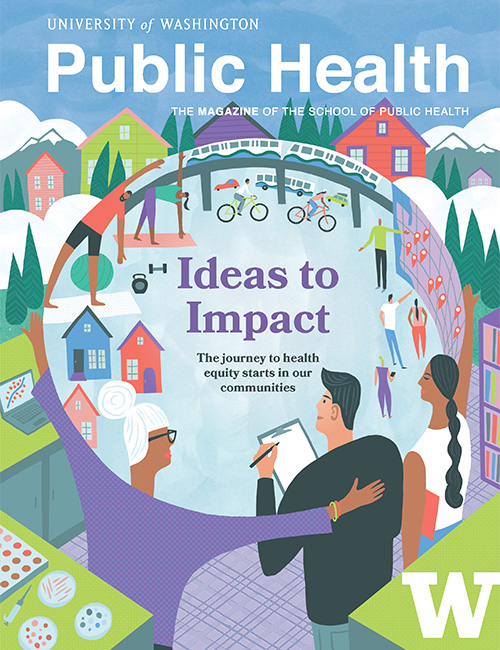The beginning of a vital journey
WRITTEN BY ASHLIE CHANDLER
PHOTOS BY ELIZAR MERCADO
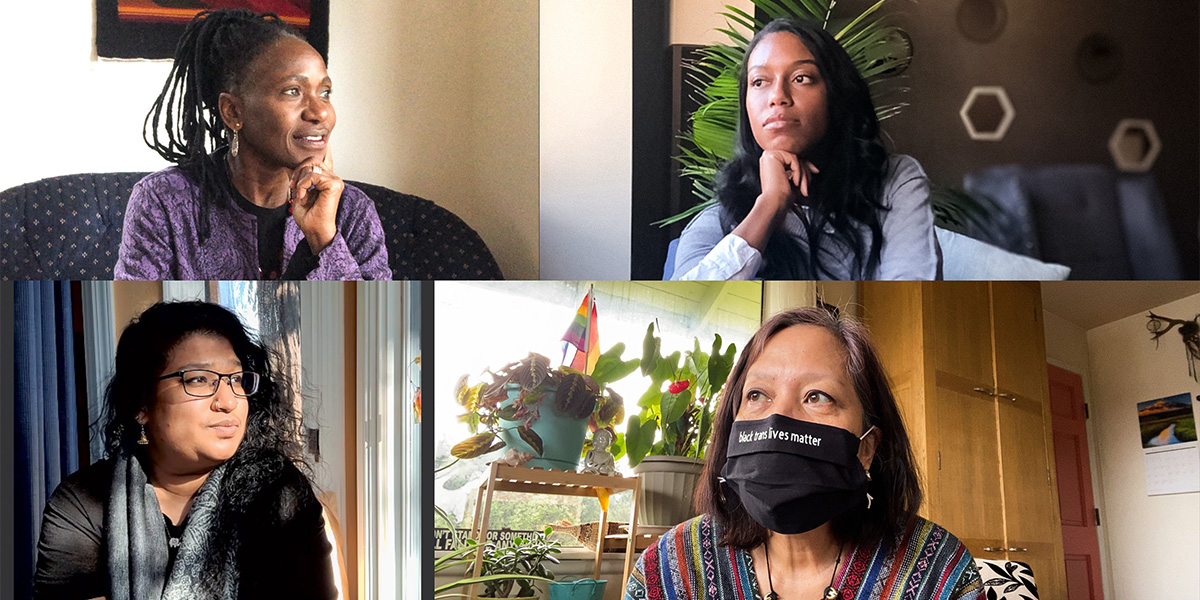
Close your eyes. Take a deep breath in through your nose. Exhale all the air out through your mouth.
These are the calming words Shanise Owens, a doctoral student at the UW School of Public Health, would hear every Wednesday at 10 a.m. last fall as she and other participants worked through a mindfulness breathing exercise on Zoom. The group would repeat these steps several times for a few minutes, and then they’d get to work.
This is not a common practice in meetings in academia, but it is how a team leading equity, diversity and inclusion (EDI) efforts at the School began each of their meetings in 2020, a year unlike any other. As the world stared down a deadly virus devastating Black, Indigenous and Latinx communities, saw a new moment of reckoning on racism, and anxiously awaited the results of a future-shaping U.S. presidential election, the SPH EDI team took a moment to breathe.
The breathing exercise helped Owens, an EDI research assistant, to center herself — to bring her awareness and attention to how she was feeling in that moment and to set intentions for the difficult work ahead. Much of that work over the last 10 months has been focused on developing the first in a series of School-wide anti-racism trainings. This is just one step on a larger road map guiding the School toward becoming an anti-racist institution, a charge that is long overdue and has been driven by students.
Also on the road map are strategies to improve the way the School attracts, hires and matriculates faculty, staff and students from different backgrounds, and to remove barriers that prevent them from being successful. The School is taking a hard look at the way students are educated, research is conducted and other operations are handled, at the same time recognizing there is still a lot of healing that needs to take place. This inward gaze is a vital part of the School’s pursuit to dismantle systemic racism, a public health issue that requires acting to undo the racist policies that continue to shape everyday realities of health for communities.
“People know what health disparities are intellectually but they don’t know it spiritually,” says Owens, who studies in the Department of Health Services and also has master’s degrees in clinical psychology and global mental health. “When you talk about health disparities, you’re talking about my uncle who died because he avoided treatment at a hospital due to COVID-19 and my older cousin who works in public transportation and is now on life support because of COVID-19. How do we start changing the conversation so it’s not so intellectual but you actually feel it in your heart and you understand that these are real lives that matter?”
This is a hard question to answer, and the challenging task to find a solution seems to rest on the shoulders of EDI team members and volunteers. It’s clear that having these tough and uncomfortable conversations is necessary to bring about the kind of change Owens and others want to see, and that the School is committed to making. A seismic shift is also needed in the way leadership, faculty, staff and students think about themselves and how they maintain racist structures.
There isn’t one right way to undo 500 years of racism and, to be clear, the School is likely never going to fully become anti-racist.
“Anti-racism work is a journey and we’re at the very beginning,” says Victoria Gardner, assistant dean for EDI, who joined the School in 2018. Gardner now has a team that includes rukie hartman, an Office of the Dean staffer who supports EDI part time, and Ahoua Koné, co-chair of the SPH EDI Committee, a School-wide governing body.
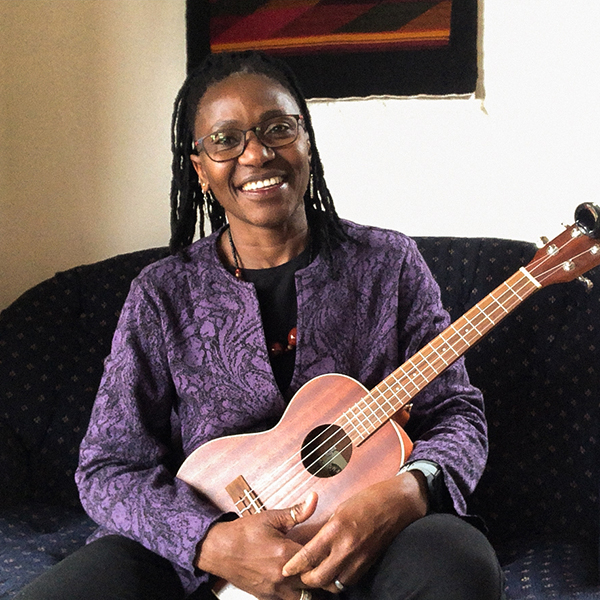
“There isn’t one right way to undo 500 years of racism and, to be clear, the School is likely never going to fully become anti-racist,” says Koné, a clinical assistant professor in the Department of Global Health. “Even the slightest change will be hard to achieve.”
Though this team has taken on the hard and harrowing responsibility to discover and implement strategies to help move the School along its path, every person within the institution must also see themselves in this work. The positive news is that there is a starting point, as the School launched its new anti-racism training in the fall of 2020. Created by Gardner, Koné and hartman, in collaboration with Owens and a School-wide anti-racism work group, the training takes a community-based approach that emphasizes continuous unlearning and relearning at the individual, interpersonal and system levels.
Participants are introduced to race, racism, anti-racism and white supremacy culture in organizations as well as techniques for modeling anti-racist behavior. This provides the School a shared language and framework, what hartman says has historically been non-existent. So far, nearly 200 core faculty and 230 staff have taken part in the first training sessions offered by the EDI team. The School will continue to offer the training through 2021 and is committed to seeing this type of work continue into the future.
To complement the universal training, faculty, staff and students are urged to build upon their anti-racism practice in affinity groups, community spaces where problems can be discussed and solved. People can also engage in additional skills- and action-based trainings that address issues such as microaggressions. Additionally, they can take part in activities or programs centered on a Common Book for all members of the School community. Fittingly, this academic year, the School is reading "How to Be an Antiracist" by Ibram X. Kendi as its Common Book.
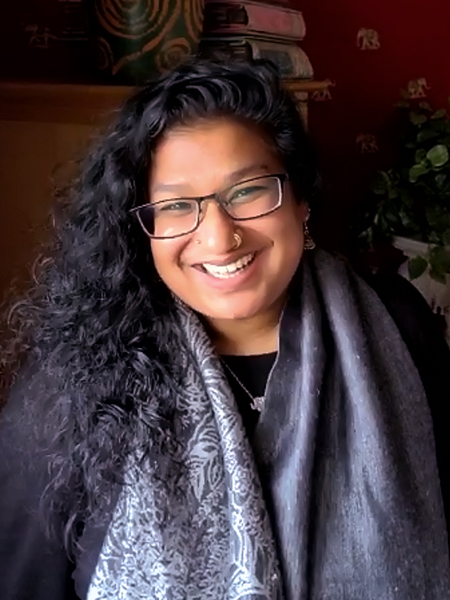
To establish accountability and transparency, the School will need to collect data on these trainings, along with other activities, and develop metrics to measure their impact. The team recognizes that this is not an easy thing to do, and “people will have to reconsider and critically think about what it means to ‘measure’ this sort of thing,” Gardner says, “Anti-racism training doesn’t typically have benchmarks.”
Says hartman: “The goal shouldn’t be to show how great we are in numbers. It’s about that cultural change and knowing there is a sense of trust in our community. To me, the real measure of good EDI work is how people feel, and it’s much harder to measure feeling.”
Following the murder of George Floyd in May 2020, Dean Hilary Godwin was motivated by a call from more than 300 students to create School-wide anti-racism training, and she entrusted the EDI team with developing it. The initiative — and the School’s greater EDI road map — was also informed by earlier work led by faculty members Amy Hagopian, Clarence Spigner and India Ornelas to develop a curriculum competency requiring all students in the School to “recognize the means by which social inequities and racism, generated by power and privilege, undermine health,” according to their published paper. A similar curriculum competency was also adopted by the Council on Education for Public Health for accredited MPH programs after recommendations were made by the School’s curriculum committee.

“The article is a wonderful gift from the authors to help all of us, not just students, think about how we can do our work better,” Gardner says. “We want to challenge people in the School to take this on as part of their individual work to become better humans and better public health professionals.”
These acts of innovation continue to happen in EDI committees in departments across the School. Folks in the Department of Epidemiology recently produced a course development tool to help instructors modify their teaching and course materials to reflect EDI and anti-racism principles. In 2019, a team from the Department of Global Health led a qualitative study that depicted the lived experiences of people in the School and defined priority areas of improvement. The study was funded by a Diversity and Inclusion Seed Grant from the UW’s Office of Minority Affairs with matching funds from the department and the School’s Office of the Dean.
Owens says this sort of funding is important to propel EDI and anti-racism efforts forward and to signal a commitment to change. She and other students have been key to moving EDI forward, offering their voices to compel the School to address its own racism. According to Owens, students want to see more funding for EDI, more representation at all levels of the School and more anti-racist principles incorporated in public health teaching and research. Some of this work is already under way throughout the School.
Owens is hopeful about the School’s anti-racism journey and the role she can play, but she is also mindful of her own well-being, she says, and the breathing exercises have helped.
Anti-racism work is a journey and we’re at the very beginning.
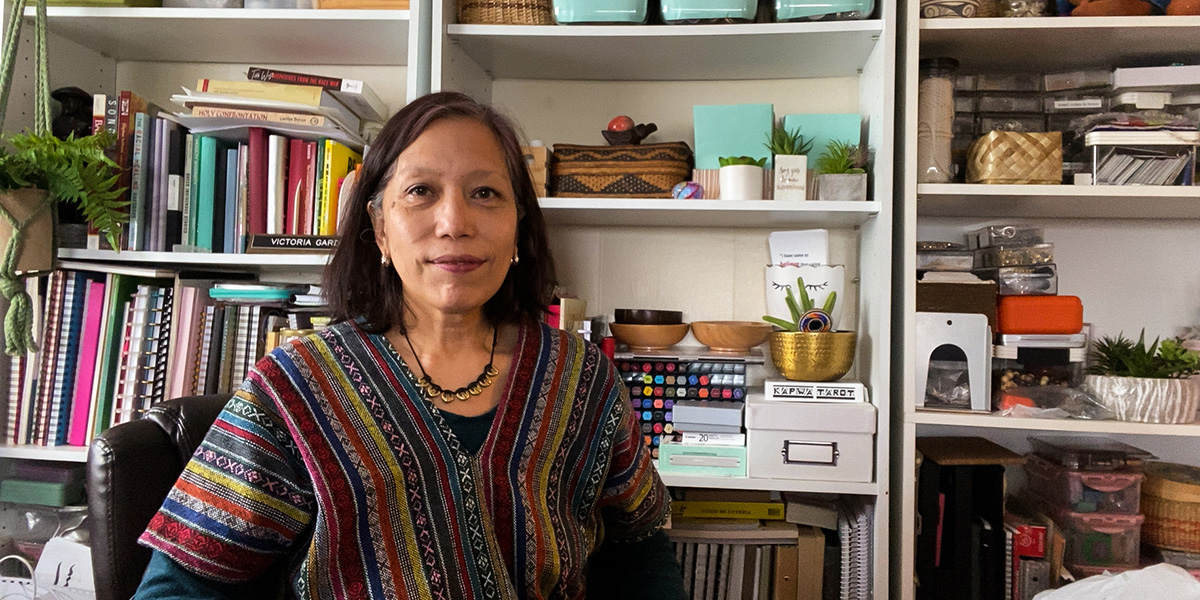
“These trainings encourage us to have the uncomfortable dialogue about hundreds of years of discrimination and racism in public health,” she says, “and that dialogue continues to move us along the path toward creating a more diverse and inclusive environment within the School.”
The School may make mistakes along its journey to become anti-racist, but it is the accountability, reflection, growth, continued learning and actions that come next that truly count, she says.
